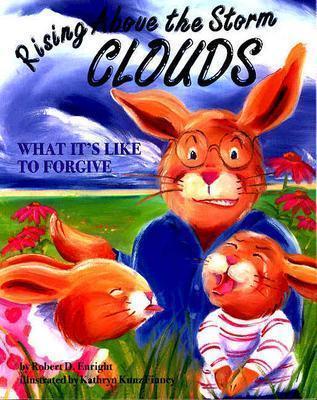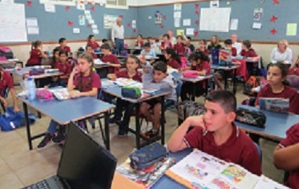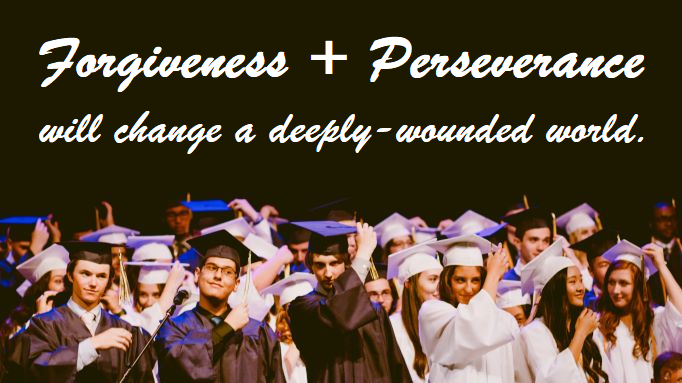Tagged: “forgiveness”
What is more important, justice or forgiveness?
I do not think you should choose between them. Plato placed justice at the top of the moral virtue hierarchy in this book, The Republic. I think agape love (in service to others even when it is painful to do so) is the highest because it includes being just to others and forgiving others. We need both justice and forgiveness under the umbrella of agape to have the best world and in the case of justice and forgiveness, the best of both worlds of these virtues.
Is respect or love higher in the forgiveness process?
Both are worthy parts of forgiving. You can respect a person from a distance. When you love, you are entering into a deeper commitment to aiding the other person, as best you can, given your particular circumstance with this person at the moment. This “entering-in” makes love deeper, more special, and more challenging.
Perseverance as the Missing Piece to Family, School, and Community Forgiveness
Having studied the psychology of forgiveness since 1985 and having helped plant forgiveness education in schools since 2002, I have come to realize that there is another moral virtue that needs to exist alongside forgiving if forgiveness is to mature in minds, hearts, and groups. That virtue is perseverance, or the willed decision and action to keep going despite challenges and to not get distracted by other issues. In the ethical treatise, Virtues and Vices (attributed to Aristotle, but possibly written by one of his followers), the virtue of perseverance or endurance is said to exist alongside the virtue of courage and daring. I would add that perseverance will be a moral virtue as long as it is connected to both wisdom and justice (as well as courage) because it is good only if the goal to which people are dedicating a good part of their lives is fair and reasonable. Persevering in bank robbery, for example, is vice not virtuous.
Perseverance is rarely discussed in modern society as we play with our gadgets and move from one forum to another. This kind of quick movement is part of what the 17th century French philosopher, Blaise Pascal, in his masterful work, Pensées, refers to as diversion. He challenged readers by saying that most people cannot endure even one hour alone in their own room without seeking new diversions. If this was the case over four centuries ago, how much more might diversion be weakening our ability to engage in the moral virtue of perseverance now?

In an earlier blog, I related an interaction with Mr. Brian McParland of St. Vincent de Paul Primary School in Belfast, Northern Ireland in the fall semester of 2002. Upon approving forgiveness education in his school, he told me that I would last only 3 years at this task because that is all the time anyone ever seems to give to new classroom initiatives. In other words, people do not persevere. I have seen the same in local groups that start forgiveness education programs with adults only to have them fade over time. Yet, as Aristotle reminds us, and challenges us, it takes time to grow deeply in the moral virtues. We do not become proficient in any moral virtue by giving it a try for a little while any more than we become physically fit by hitting the gym for a month and then going back to the couch and the potato chips. It takes time and effort to become forgivingly fit. It takes time to grow in the moral virtue of perseverance.
So, it seems to me that the first step in growing intra-personally in forgiveness, in aiding families and schools and local community organizations to grow in forgiveness is to openly and boldly and persistently discuss perseverance and the serious challenge all people face as they say, “Let’s hit the forgiveness gym!” Without perseverance, we lose our forgiving fitness very soon.
How much perseverance do we need to change the world? It seems to me that we need to introduce students to forgiveness, without forcing them to forgive, from age 4 to age 18. It seems to me that we need two generations, about 40 years, of forgiveness in communities to change those communities and to change community-to-community conflicts, even brutal conflicts that seem at present to have no end in sight. Forty years? Forty years when there will be new distractions, new shiny diversions? Yes, and it is the teamwork of forgiveness and perseverance, and leaders who will take over for other leaders, that will win in the peace movement. This combination of forgiveness and perseverance never has been tried anywhere in the world at any time in human history. It is time.
With perseverance, we might just be able to bring forgiveness for good to a deeply wounded world. Long live perseverance! Long live forgiveness!
![]()
Study in Greece and Saudi Arabia Reveals Teacher Attitudes on Forgiveness and Cross-Cultural Differences
Because school-based Forgiveness Education programs have been rigorously and repeatedly tested, there is little question about the effectiveness of such programs to provide significant reductions in student anger and depression as well as meaningful increases in tendency to forgive.
What is less certain—and, to date, barely studied—is what role a teacher’s personal understanding of forgiveness plays in influencing those outcomes. A just-completed scientific analysis, conducted by an international team of forgiveness researchers under the direction of Dr. Robert Enright, is providing some answers to that question.
“Teachers’ Views of Forgiveness Education: A Cross-Cultural Examination in Greece and Saudi Arabia” was published this month in the journal FIRE: Forum for International Research in Education (Vol. 7, Issue 3, 2023, pp. 99-116). FIRE publishes “internationally comparative education data and evidence-based achievement studies.”
Dr. Peli Galiti, Director of the IFI Greek Forgiveness Education Program, has trained more than 1,000 teachers in Greece to use the Forgiveness Education Program which is now being taught to more than 10,000 students there. (Image by Rawpixel.com)
The new study not only analyzed teachers’ views of forgiveness education but also explored cross-cultural similarities and differences with a total of 134 teachers participating—76 Greek and 58 Saudi. The two countries have unique and rich cultural histories and influences: Greece is part of the Eurozone and Eastern Orthodoxy is its main religion; Saudi Arabia is an Arab state, and its main religion is Islam.
Study participants completed a comprehensive online survey asking about the meaning of forgiveness, topics they felt should be included in forgiveness education, and their perceptions of the benefits and challenges of teaching forgiveness education. The questionnaires were then analyzed using a variety of assessment tools including two-tailed proportional testing.
Comparing Greek and Saudi Arabian teachers’ perspectives resulted in these findings:
- More Saudi than Greek teachers viewed forgiveness as reconciliation.
- More Saudi than Greek teachers viewed forgiveness as excusing an unjust act.
- More Greek than Saudi teachers viewed forgiveness as a merciful act.
- More Greek than Saudi teachers viewed calmer students as a benefit of forgiveness education.
- More Greek than Saudi teachers viewed conflict resolution skills to be a benefit of forgiveness education.
- More Saudi than Greek teachers thought students would take advantage of forgiveness.
“Those results reflect not only the cultural differences of the participants but also the fact that 31 of the Greek teachers had previously received several hours of forgiveness education training while none of the Saudi teachers had specific training or forgiveness teaching experience,” Dr. Enright observed. “This ground-breaking study is important because it emphasizes the influence teachers’ views can have on forgiveness education.”
Dr. Enright, co-founder of the International Forgiveness Institute (IFI), added that studies like this one can help him and other forgiveness researchers tailor teacher training and customize curricula to better reflect effective implementation techniques.
The Kingdom of Saudi Arabia, a country of 27 million people, has the world’s largest petroleum reserves and is the world’s largest oil exporter. (Image by Rawpixel.com)
In 2002, Dr. Enright initiated a forgiveness education program in Belfast, Northern Ireland that has now been in operation for over 20 consecutive years. His Belfast work is featured in the award-winning documentary The Power of Forgiveness.
Dr. Enright started similar programs in Liberia, West Africa in 2011 and in Israel-Palestine in 2013. He now has such programs in more than 30 regions around the world and an IFI Branch Office in Pakistan at the Government College University Lahore (GCU-Lahore, Pakistan).
In addition to Dr. Enright, the cross-cultural study was conducted by Peli Galiti, John Klatt, Nahlah Mandurah, and Lai Wong—all affiliated with the University of Wisconsin-Madison. Author bios and the complete teacher survey instrument are included in the study document.
Read the full study: Teachers’ Views of Forgiveness Education.
Dr. Enright’s Book Named One of “Best Children’s Books About Forgiveness”
As it nears its 20th anniversary of publication, Dr. Robert Enright’s only children’s book, Rising Above the Storm Clouds: What It’s Like to Forgive, has been selected for inclusion in an exclusive list of “the best children’s books about forgiveness.”
The honor was bestowed on Dr. Enright’s book by Bookroo—the world’s largest website platform dedicated entirely to children’s books. The website, with more than 30,000 children’s books in its curated digital collection, says its goal is “to make it convenient for parents and magical for kids to fall in love with reading!”
 Rising Above the Storm Clouds was written by Dr. Enright in 2003 and was published the following year by Magination Press, the publishing arm of the American Psychological Association. It is a 32-page book crammed with colorful full-page illustrations by Kathryn Kunz Finney, a popular artist and portraitist specializing in children and pets.
Rising Above the Storm Clouds was written by Dr. Enright in 2003 and was published the following year by Magination Press, the publishing arm of the American Psychological Association. It is a 32-page book crammed with colorful full-page illustrations by Kathryn Kunz Finney, a popular artist and portraitist specializing in children and pets.
In the book, a brother and sister who are angry with each other learn from their father the benefits of forgiveness through a series of symbolic images. Together they see what it’s like to forgive and discover that forgiveness can feel good to the forgiver, perhaps even more so than to the one forgiven.
The book also includes a note to parents from Dr. Enright, co-founder of the International Forgiveness Institute (IFI), in which he defines forgiveness, differentiates it from reconciliation, and guides parents in helping their children learn how to forgive. He also highlights in that note why children should learn to forgive:
“Forgiveness has a way of cutting through our angers and resentments to give all involved a fresh start. As you forgive, you are set free from the prison of resentment. As you offer forgiveness to another person, he or she has the chance to begin anew with you, trying to be more civil, more respectful, more kind. Those around you benefit because you are less likely to carry your anger into other situations. You are less likely to displace your anger onto those who don’t deserve it.”
According to Bookroo, children’s literature offers an ideal medium for helping children develop the ability to forgive their friends, family members, and others. That sentiment is echoed by another children’s book website called the Third Hour which is funded by the More Good Foundation. Third Hour has Rising Above the Storm Clouds listed 3rd on its top ten checklist of “books that teach children—from toddlers to tweens—the importance of forgiveness.”
Both the Bookroo and Third Hour websites include these other popular children’s books on their “Best Forgiveness Books” list:
- The Year the Swallows Came Early, Kathryn Fitzmaurice
- I am Extremely Absolutely Boiling, Lauren Child
- Will You Forgive Me?, Sally Grindley and Penny Dann
- Enemy Pie, Derek Munson
- The Forgiveness Garden, Lauren Thompson

Students in more than 30 countries around the world– like these at Mar Elias Elementary School in Ibillin, Israel (near Nazareth) — learn about forgiveness through the IFI’s Forgiveness Education Program.
All those children’s forgiveness books are not only on the best books lists but have also been recognized for their positive moral values by Dr. Enright. Because of that, they are all included as supplemental reference materials in one or more of his Forgiveness Education Curriculum Guides that are available for pre-kindergarten through grade 12 students.
Rising Above the Storm Clouds is incorporated into both the 3rd and 4th grade curriculum guides as part of that IFI Forgiveness Education Program. The book is available in both hard cover and paperback versions for as little as $3.01 (used condition) on various websites including amazon.com, amazon.com.uk, ThriftBooks.com, and ebay.com. It is also available in a 10-minute online video version produced and narrated by Mary Lou Coons, founder of the Puppets for Peace Foundation.




